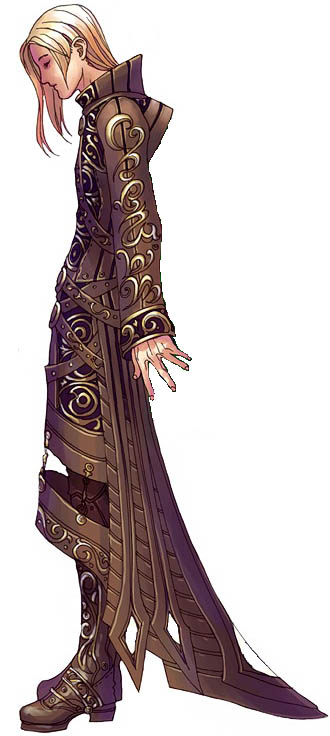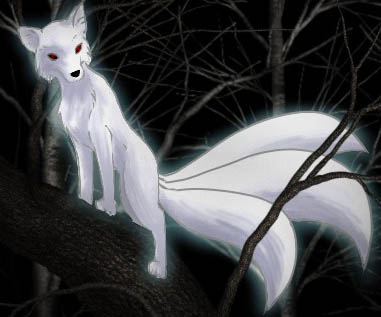Difference between revisions of "Mahanaga"
| Line 66: | Line 66: | ||
===The White Fox Guardians=== | ===The White Fox Guardians=== | ||
| − | |||
| − | |||
| − | |||
The white fox guardians are the little gods of each of the rice fields around Mahanaga. Each field has a white fox guardian, one of the children of the White Field Steward. Traditionally, the farmers leave small offerings of smoked fish in the fields on nights of the full moon, as the white fox guardians love them. They are not worshipped, per se — that is the privilege given to the White Field Steward himself. In times of spiritual danger to the fields, the white fox guardians can muster quite a defense, with their father at the head of their little army. | The white fox guardians are the little gods of each of the rice fields around Mahanaga. Each field has a white fox guardian, one of the children of the White Field Steward. Traditionally, the farmers leave small offerings of smoked fish in the fields on nights of the full moon, as the white fox guardians love them. They are not worshipped, per se — that is the privilege given to the White Field Steward himself. In times of spiritual danger to the fields, the white fox guardians can muster quite a defense, with their father at the head of their little army. | ||
Revision as of 12:11, 13 May 2008

|
The town of Mahanaga is built at the foot of the great Monastery of the Serpent King. Several hundred years in age, the town manages a thriving and healthy economy based around farming (especially of rice) and the breeding of rare serpents as pets and sources of antivenin.
Serpents are naturally drawn to the Monastery, and the monks must routinely carry the serpents away from it, lest its corridors become too filled with them. They usually take these serpents down to the Fang Market in Mahanaga, where residents of the town are permitted to bid on ownership of those serpents. All such proceeds go towards supporting the monastery and its monks, while the residents of the town make more than their return in money. The monks who run the Fang Market have laws against non-residents from bidding in the Fang Market, which helps maintain the town's economy.
The town itself knows that there is a great serpent god associated with their town somewhere, though it is very reclusive. THe monks who serve him do not worship him, and forbid others from doing so, saying that it angers the Serpent King. In truth, the interactions between the Serpent King and the townsfolk of Mahanaga is somewhat more...intimate. Occasionally, a woman in the town will give birth to a child with beautiful golden eyes. Such children are destined to serve in the Monastery of the Serpent King as monks, and are brought to the monastery upon leaving childhood (around the age of twelve or so).
Contents
Noteworthy Locations in Mahanaga
The Monastery of the Serpent King
The Monastery of the Serpent King is, in actuality, an ancient Solar manse, built as a temple to the Unconquered Sun. The strange crenellations and designs along the sides of the staircase that lead to the top of the monastery serve a purpose: during Calibration, the sun’s position in the sky shifts subtly with each day, just enough to make it appear that the shadow of a serpent starts at the top of the staircase, and slithers further down the staircase each day of Calibration, ending its last day at the very foot of the stair.
Aspect: Solar; Rating: 3
Drawbacks: The Monastery of the Serpent King has the following Drawbacks:
- Maintenance •: Once a year at Calibration, as the shadow serpent slithers down the stairs, the priests within must perform a set of very simple rites to keep the flows of Essence within it carefully measured and precise. This takes one hour per day of Calibration, and there is one ritual for each of the symbolic stations of the sun.
- Habitability •: The Monastery is a massive, empty open space crafted of white marble and cunningly placed golden mirrors. It has no bedrooms or other facilities for habitation, though it can provide shelter in a pinch. The monks that serve here dwell in the town that sits at the foot of the mountain in a communal cloister there.
The Cloister
The Cloister is a small collection of buildings at the foot of the mountain on which sits the Monastery. Because of the austerity of the Monastery proper, it makes for poor living space, though the Serpent Monks take their lessons and use the holy place for meditation.
The Cloister itself has a variety of small cells for the Serpent Monks proper and a Postulant's Hall for those who are seeking admission into the monastic order while they are tested and learning the basics of the order's lessons. There is also a mess hall for the meals of spicy serpent meat (which some claim are prepared with small quantities of the venom of holy cobras) and rice that form the diet of the monks.
The Cloister also maintains a guest house, capable of hosting up to ten guests in satisfactory style, generally used for guests of the Monastery and Abbot.
The Platform
In the center of the village, in large square that overlooks the path up to the Monastery and the Cloister, stands the Platform, a circular, elevated stage of some antiquity. It is made of stone, though the surface of the Platform is a lacquered hardwood.
This Platform sees a variety of uses, from acting as a stage from whence the Abbot of the Monastery may address the people of the village to a performance place for traveling musicians. It is the center around which most festivals happen, as well. Generally speaking, the Platform is a sort of axis mundi for Mahanaga.
The Platform's most frequent use, however, is as a dueling stage. On an almost daily basis, young monks challenge one another to martial arts contests atop it, as do those folk of Mahanaga who can't seem to resolve their differences peacefully. Dueling isn't common among the citizenry, but it happens frequently enough that the young novice monks charged with keeping the Platform well cleaned rarely are without work to do.
Occasionally, traveling martial artists who have heard of the Serpent Monks and their talents come through here to challenge one or more of them. Even more rarely are those who come to challenge the Abbot of Mahanaga, a man renowned for his mastery of the supernatural martial arts, and a terrifyingly fast and skilled fighter.
The Fang Market
The Fang Market is where the Serpent Monks congregate once a week to sell the various serpents that have been drawn to the Monastery. All such sales are made to residents of the town, who then turn right back around and either sell the snakes to others directly, or take them home to use in the making of any number of local products: large serpents are butchered for meat and snakeskin, while venomous ones are milked for poison (either to be sold directly or turned into antivenin).
The Fang Market's center is called the King's Throne, and is simply a dias carved with serpent motifs where the monks do the selling. The rest of the Market is made up of the various booths, blankets and wagons where residents of the city sell their wares. By local custom, no one sells serpents or ophidian-derived products anywhere but the Fang Market.
A small pavilion built alongside the Serpent's Kiss caravanserai, facing the Market, is reserved for visitors and travelers who wish to watch the goings on while sipping tea. Important local merchants are often invited to meals beneath the canopy here to discuss large purchases of native goods.
The Serpent's Kiss
The only caravanserai in Mahanaga, the Serpent's Kiss caters primarily to merchants and other travelers who come through the area. The locals never congregate in its tearoom, by local custom.
Gods of Mahanaga
White Fields Steward

|
X
Taruzake, the Rice Wine God

|
X
The White Fox Guardians
The white fox guardians are the little gods of each of the rice fields around Mahanaga. Each field has a white fox guardian, one of the children of the White Field Steward. Traditionally, the farmers leave small offerings of smoked fish in the fields on nights of the full moon, as the white fox guardians love them. They are not worshipped, per se — that is the privilege given to the White Field Steward himself. In times of spiritual danger to the fields, the white fox guardians can muster quite a defense, with their father at the head of their little army.